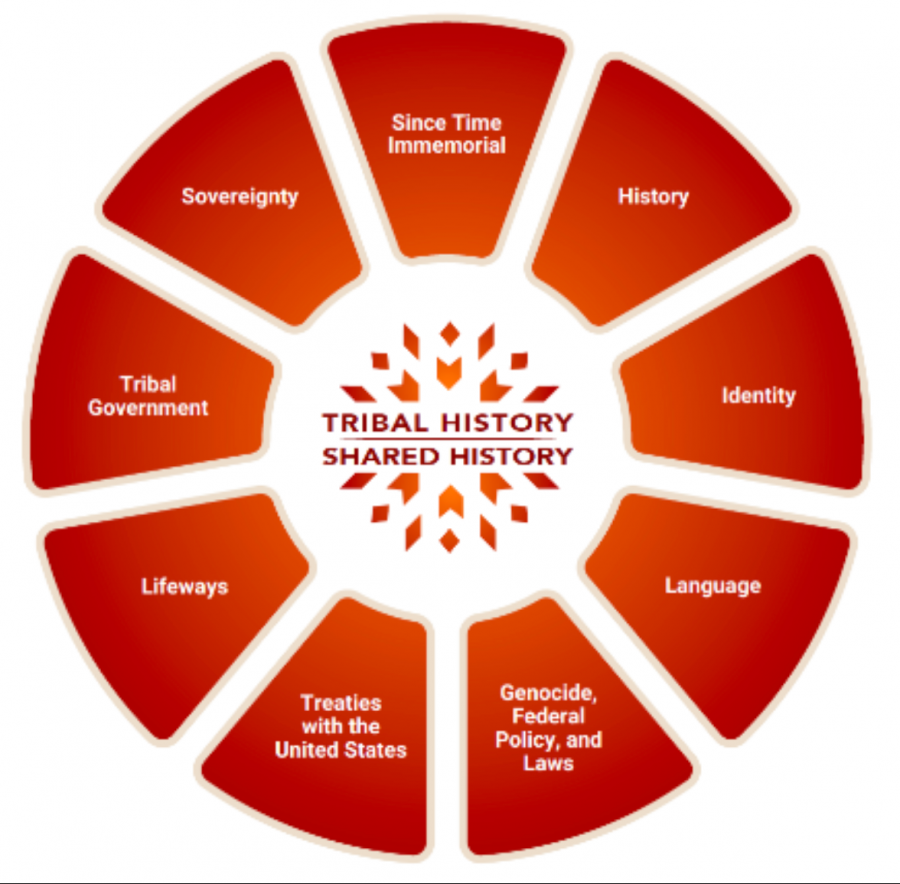Teaching tribal studies with senate bill 13
The tribal studies course will work with nine federally recognized tribes to create a curriculum that will be implemented into Oregons history classrooms.
February 27, 2021
Emphasizing the voices of Indigenous peoples and teaching about their histories and culture in schools is what the new Tribal History curriculum aims to do.
Senate Bill 13 (SB13) was passed by the Oregon Senate in 2017 and required the Oregon Department of Education (ODE) to work with Oregon’s nine federally recognized tribes to create a tribal history curriculum. The curriculum is designed for the fourth, eighth and 10th grades to be implemented into history and other classes.
According to ODE, the Essential Understandings Advisory Committee, made up of representatives from Oregon’s tribes, made a list of essential understandings that guided lesson plans created by ODE. Including since time immemorial, history, identity, language, genocide, federal policy and laws, treaties with the United States, lifeways, tribal government and sovereignty.
Senior and Native American Student Union leader Zadie Schaffer, who belongs to Choctaw Nation in Oklahoma, advocated for the bill as it was going through the Oregon Senate. She believes passing SB13 was essential and overdue.
“Oregon’s been ignoring their history for so long that, especially since [Portland] has become a liberal bubble, now people are really trying to focus on bringing that history back,” said Schaffer.
Prior to the bill’s passage, Schaffer gave talks to Portland Public School (PPS) administrators as well as history teachers about the bill and what they can do to help teach students about native history. The book she published in 2018 “Notable Women of Portland” was also used in creating the tribal history curriculum and lesson plans for PPS elementary schools.
According to Vice Principal Mariam Higgins, all teachers participated in a tribal history professional development training about including tribal history lesson plans in their curriculum before the start of the 2020-21 school year. Some teachers continued their professional development over winter break.
Matt Reed, a U.S. History: Ethnic Studies teacher, attended the ODE training over winter break. The training was a self paced module with videos and readings along with self reflection questions after each section.
One of the biggest things Reed learned during the training was new key terms and a shift in language to be implemented when talking about tribal and shared history.
“In a social studies class we talk about time in a very linear way which is a really colonial way of thinking about time. The training introduced the term ‘time immemorial’ as a decolonized term. Another decolonized term would be talking about land, the stewardship, occupying land, and relating to land, rather than owning or controlling land.”
Time immemorial is a way to describe a very long time, predating European contact and written history and inclusive of oral traditions.
Reed said the training focused on recognizing settler colonialism and teaching about the violence, disposession of land, and genocide Indigenous people have faced. Additionally, it offered six lenses for teaching in a way that includes tribal and shared history across all subjects.
“I really appreciated those lenses because then it [led] me to think, I can bring that way of thinking into all of my classes and all of my teaching… not only is it more inclusive of Indigineous people but I think it helps me dismantle the system of white supremacy and oppression that operates [in teaching],” Reed said.
While the training was helpful and informative for Reed, it is important to note that he took the class outside of work hours. Because PPS and ODE expect teachers to do optional further professional development outside of work hours, not every teacher has had the same opportunity.
“The reason why we haven’t learned [tribal history] isn’t because we don’t have time; it’s because Indigenous history is not valued enough. Indigenous peoples aren’t valued,”said Reed.
Reed wants this to change.
“How do we look to Indigenous peoples as experts and leaders? Not just to study, but learn from them,” he asks.
English teacher Barbara Brown believes the ODE needs to play a stronger role in holding schools and districts accountable for implementing this curriculum.
“To me, if the state really believes in this they would make the time and create the opportunity for teachers to have the time and resources to use these new lessons that are very important,” said Brown.
As a student, Schaffer agrees and believes Lincoln needs to put more effort into incorporating tribal and shared history into 10th grade classes.
“I think that Lincoln’s role, especially as [a school] so close to very history-rich land, is that they really need to take a stronger stance in making this kind of history known,” she said.
She also noted there was a lack of education about Indigenous history throughout PPS schools.
“We were never taught about Indigenous cultures who were incredibly advanced. We’re completely wiped off the map, in terms of their civilizations and their culture and their people,” Schaffer said. “I feel like we really need to give homage to the people whose cultures were wiped away. I really think that we need to learn more about the native cultures because we learn so much about other cultures and it seems only right that we learn about the cultures that were on this land before we were.”
While Schaffer believes Lincoln needs to play an important part in implementing the curriculum, she acknowledges that Lincoln may be limited by the International Baccalaureate (IB) curriculum.
“I can understand why it might be easier to teach in elementary schools and in [other] high schools, because especially with being an IB school, Lincoln is very confined to a certain curriculum,” said Schaffer. “They have to teach a very specific set of things, and I can understand why it might be difficult to kind of weasel in something that isn’t in [that] curriculum.”
While the bill is a good first step towards learning about the history of Indigenous peoples, Schaffer, Brown and Reed all agree there is a long way to go. Currently, the curriculum only benefits three grades, but needs to be developed to incorporate tribal and shared history to K-12 students, in all “ways of learning.”
“I’m really glad that our state leaders prioritized and listened to Indigenous leaders to make this curriculum possible,” said Reed. “I’m glad that it’s being more and more prioritized, but I don’t think it’s enough, and I don’t think they would say it’s enough, either.”






